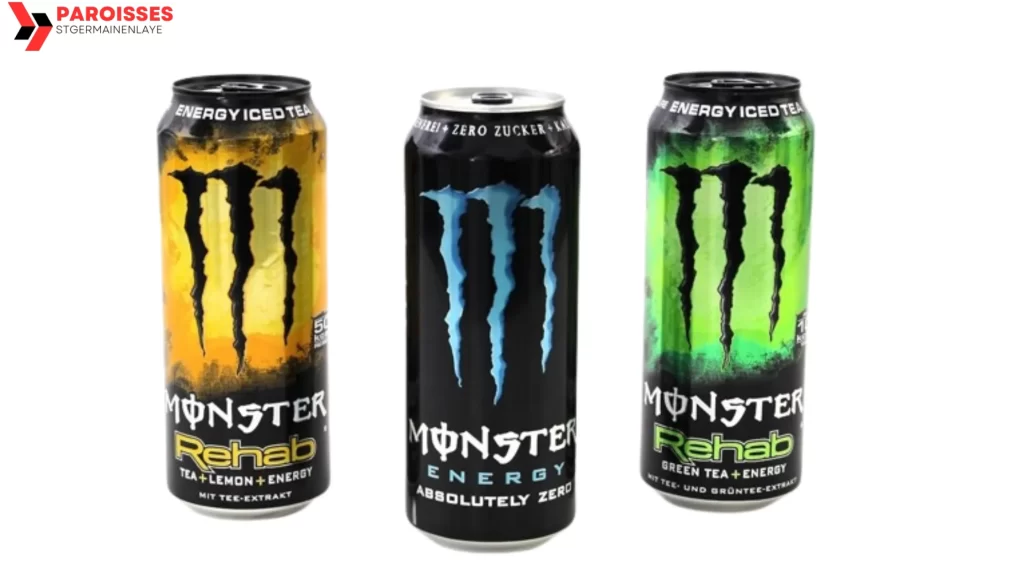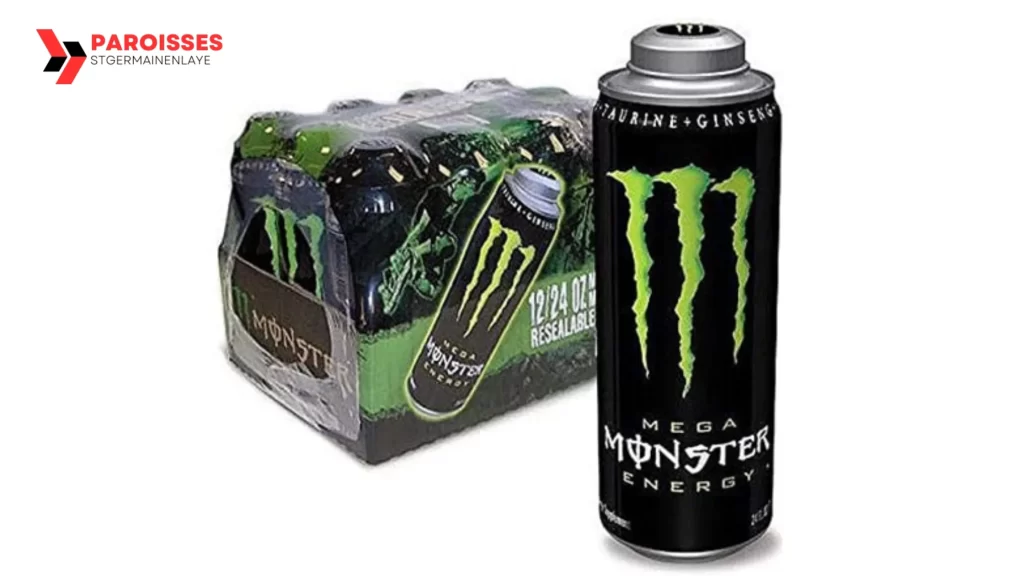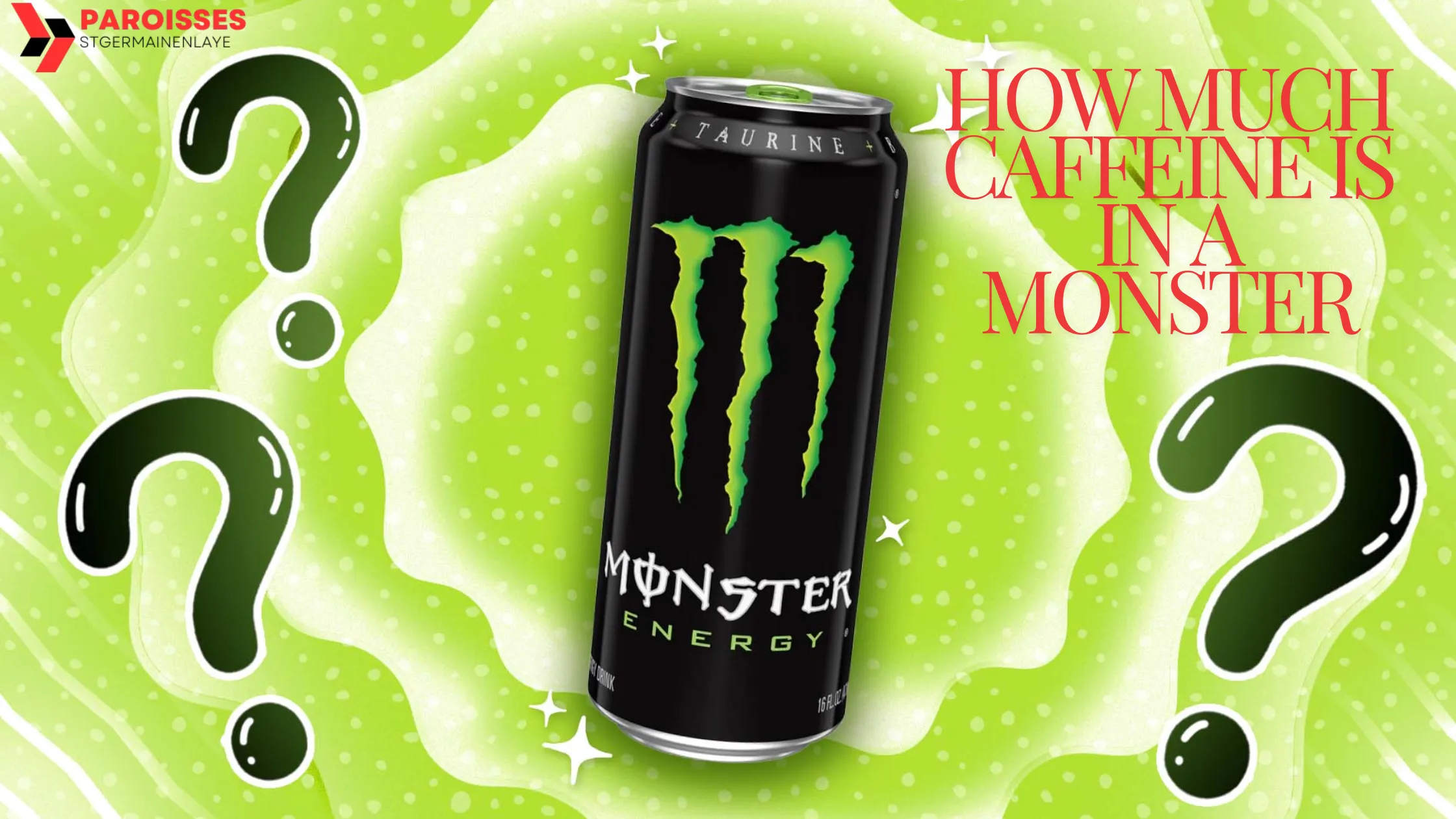Table of Contents
How much caffeine is in a Monster? If you’re a fan of energy drinks, you’ve likely reached for a can of Monster Energy at some point to give you that extra jolt of energy. But do you know what’s inside? One of the most essential ingredients is caffeine—the key to keeping you alert and awake. Monster Energy is famous worldwide, but understanding how much caffeine you drink is critical, especially if you’re concerned about your health.
In this article, we’ll look at how much caffeine is in a Monster Energy drink, what that means for your body, and how it compares to other popular beverages like coffee. Whether you’re an avid Monster drinker or just curious about its caffeine content, this guide will give you all the necessary answers. Let’s break it down!
What Is Monster Energy and Why Is It So Popular?

Monster Energy is more than just an energy drink—it’s a lifestyle brand. Known for its bold flavors, flashy branding, and association with extreme sports, Monster has built a loyal following over the years. But beyond the marketing, what makes Monster Energy such a popular choice for people looking for a quick energy boost?
Monster stands out because it’s not just about caffeine. Each can is a blend of caffeine, taurine, B vitamins, and other ingredients designed to help you stay focused and energized for extended periods. Whether you’re pulling an all-nighter for a big project, preparing for an intense workout, or just needing a boost to get through a sluggish day, Monster has become the go-to drink.
However, it’s crucial to remember that while Monster Energy provides a quick surge of energy, it’s packed with a hefty dose of caffeine. This raises the question: how much caffeine is in a Monster? Let’s find out.
How Much Caffeine Is in a Monster?

So, how much caffeine is actually in a Monster Energy drink? The caffeine content varies depending on the type of Monster you choose. Here’s a breakdown of some of the most popular Monster Energy drinks and their caffeine content:
- Monster Original (16 oz can): 160 mg of caffeine.
- Monster Lo-Carb (16 oz can): 140 mg of caffeine.
- Monster Energy Zero Ultra (16 oz can): 140 mg of caffeine.
- Monster Juice (16 oz can): 80 mg of caffeine.
- Monster Assault (16 oz can): 160 mg of caffeine.
- Monster Rehab (15.5 oz can): 160 mg of caffeine.
If you opt for the giant 24-ounce can of Monster, you’ll consume around 240 mg of caffeine, nearly the daily limit for some people. That’s a lot of caffeine, especially when most health experts recommend limiting your caffeine intake to around 400 mg daily.
But Monster isn’t the only drink with caffeine. To help put this in perspective, here’s how Monster compares to some other popular drinks:
- Regular brewed coffee (8 oz): 95 mg of caffeine.
- Espresso (1 oz): 64 mg of caffeine.
- Cola (12 oz can): 34 mg of caffeine.
- Black tea (8 oz): 47 mg of caffeine.
As you can see, Monster Energy packs a much bigger caffeine punch than your average cup of coffee or soda, so it’s essential to be mindful of how much you’re consuming, especially if you’re drinking more than one can a day.
Also Read: How Long Does Tinnitus Last? Shocking Truth You Need to Know
How Does the Caffeine in Monster Affect Your Body?
Caffeine is a natural stimulant that affects your central nervous system, giving you that rush of energy and focus. However, the effects can be more intense when you consume a high amount of caffeine, like in a can of Monster. So, how exactly does the caffeine in Monster affect your body?
Once you drink a Monster, the caffeine quickly enters your bloodstream and starts working its magic. It blocks a neurotransmitter called adenosine, which is responsible for making you feel sleepy. This results in heightened alertness, improved focus, and a general sense of wakefulness. That’s why Monster is so famous among people who need a quick energy boost.
However, the effects don’t stop there. Caffeine also stimulates the release of adrenaline, making you feel more energetic and ready to take on challenges. This is why many athletes and gamers turn to Monster when they need an edge.
But there’s a downside. While the initial energy boost might feel great, the caffeine in Monster can lead to jitters, anxiety, and even crashes after the effects wear off. This crash happens because your body processes caffeine quickly, and once the stimulant is gone, you’re left feeling more tired than before. These side effects can be even more pronounced for people sensitive to caffeine.
Also Read: How Long Does Numbness Last After Filling? Shocking Truth Revealed!
How Does Monster’s Caffeine Compare to Coffee?
One of the most common questions is, “How does the caffeine in Monster compare to coffee?” It’s a fair question since coffee is one of the world’s most widely consumed caffeinated drinks. Let’s break it down.
As we mentioned earlier, a standard 16-ounce can of Monster contains about 160 mg of caffeine, while an 8-ounce cup of brewed coffee contains about 95 mg. This means that a single can of Monster has almost double the caffeine of a regular cup of coffee. But there’s more to it than just numbers.
Coffee is often consumed in smaller amounts—typically 8 to 12 ounces at a time—whereas a can of Monster is much larger. On top of that, Monster Energy contains other ingredients like taurine and ginseng that can enhance the effects of caffeine. These added ingredients are designed to help you feel more energized for extended periods, but they can also amplify the side effects of caffeine if you’re not careful.
Another key difference is how people consume these drinks. While coffee is often sipped slowly, Monster is typically consumed more quickly, which means the caffeine hits your system faster. This can lead to a more intense burst of energy and make the crash feel more dramatic afterward.
Can You Drink Monster Safely? Recommended Limits
So, is it safe to drink Monster? The short answer is yes—as long as you do so in moderation. Health experts recommend that adults limit their caffeine intake to no more than 400 mg per day. Given that a 16-ounce Monster contains 160 mg of caffeine, you could safely drink one or even two cans per day and stay within that limit. However, there are a few things to keep in mind.
First, it’s essential to consider how much caffeine you’re getting from other sources. Your total caffeine intake can add up quickly if you’re also drinking coffee, tea, or soda throughout the day. Consuming too much caffeine can lead to unpleasant side effects like restlessness, headaches, and an increased heart rate.
Second, caffeine affects everyone differently. Some people are more sensitive to caffeine than others, meaning they may experience side effects even with smaller amounts. If you find that you’re feeling jittery, anxious, or unable to sleep after drinking Monster, it might be a sign that you need to cut back.
Also Read: Wondering How Much Caffeine Is in a Monster? Get the Facts!
What Are the Potential Side Effects of Too Much Caffeine?
Drinking too much caffeine from Monster or other sources can lead to several side effects. While moderate caffeine consumption is generally safe for most people, excessive intake can cause:
- Jitters: Too much caffeine can make you feel shaky or restless.
- Increased heart rate: Caffeine stimulates your heart, which can cause it to beat faster than usual.
- Anxiety: High levels of caffeine can increase feelings of nervousness or unease.
- Trouble sleeping: Caffeine can interfere with your sleep patterns, especially if consumed later in the day.
- Upset stomach: Some people find that too much caffeine causes nausea or an upset stomach.
- Headaches: Consuming large amounts of caffeine can lead to headaches, especially if you suddenly stop after regular use.
In more severe cases, consuming large amounts of caffeine can lead to serious health problems, such as high blood pressure or heart palpitations. That’s why keeping your caffeine intake within safe limits is crucial.

